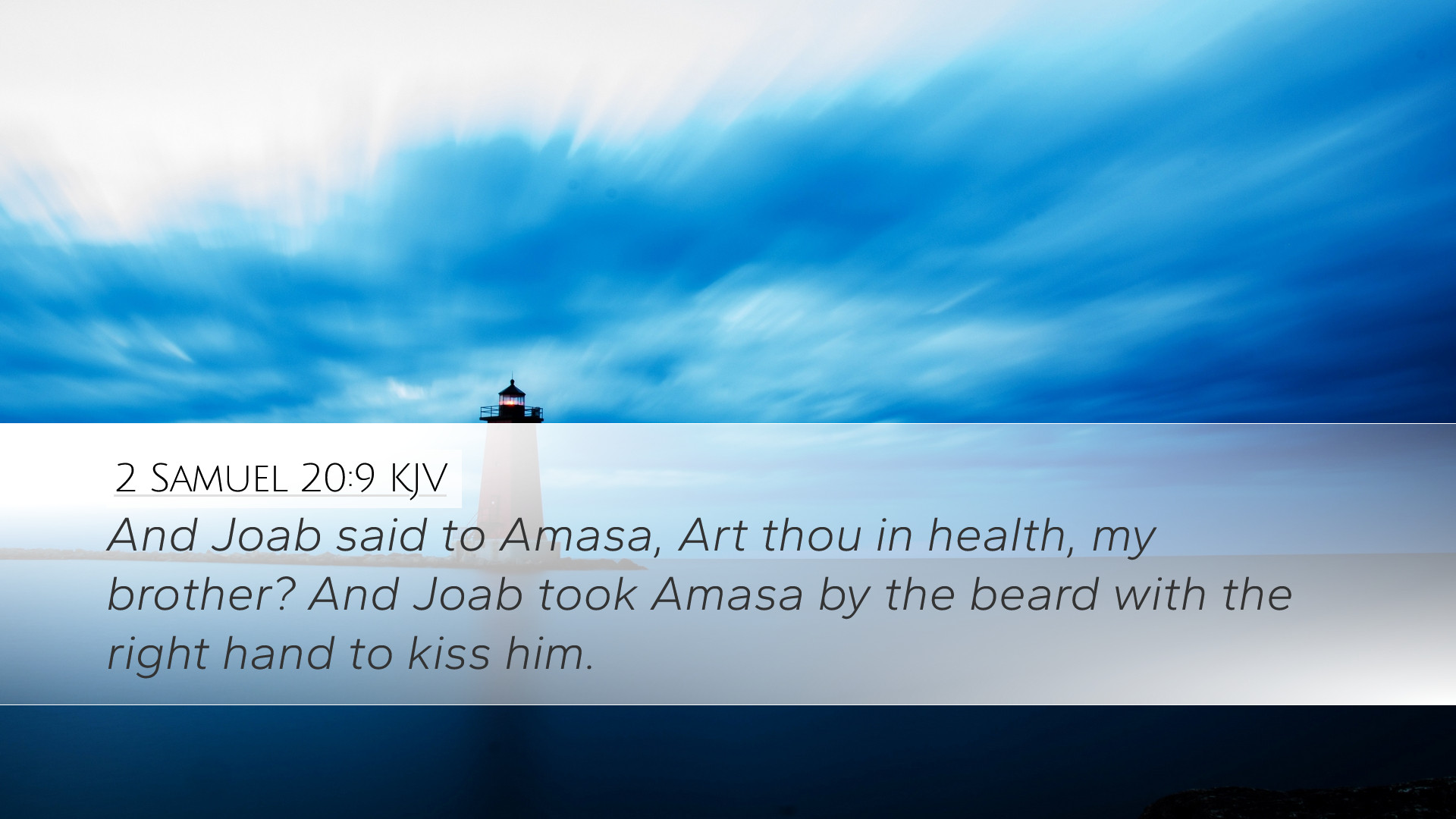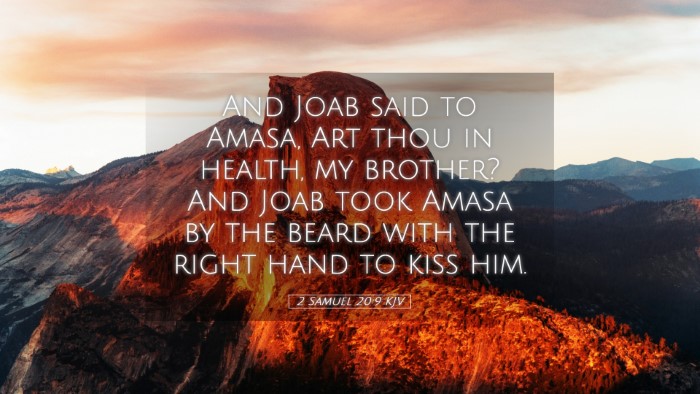Commentary on 2 Samuel 20:9
Verse Context: The verse reads: "And Joab said to Amasa, 'Are you in health, my brother?' And Joab took Amasa by the beard to kiss him." (2 Samuel 20:9, NKJV). This passage occurs during a tumultuous period in the life of David, where internal strife and rebellion against his reign are rampant.
General Overview: This verse presents a pivotal moment that underscores themes of loyalty, betrayal, and the human condition. Joab's duplicitous behavior toward Amasa is emblematic of the complex relationships within David's command structure and has much to teach about moral integrity and power dynamics.
Commentary Insights
Matthew Henry's Commentary
Matthew Henry emphasizes the treacherous nature of Joab's greeting. His faux affection towards Amasa serves to illustrate the duplicitous character of Joab, who, despite his military prowess, engages in deceit. Henry notes that Joab's act of salutation "by the beard" was not merely customary but laced with ulterior motives, reflecting a premeditated act of violence rather than genuine kinship.
Henry further elaborates that Joab's actions bring to light the tensions within the political landscape of Israel at that time, posing questions about leadership and integrity. He suggests that this dramatic encounter serves as a reminder of the moral complexities leaders face and the real dangers of trusting others where ambition and rivalry abound.
Albert Barnes' Notes
Albert Barnes provides a detailed examination of Joab's character and motivations. He points out that Joab had a checkered history filled with both valor and treachery, making him a formidable figure in David's court. Barnes argues that Joab's question to Amasa, "Are you in health, my brother?" is steeped in irony, as Amasa had recently assumed a position of authority with a conflicting agenda.
Barnes suggests that Joab's pretense here is significant. "Taking Amasa by the beard" indicates a tradition of greeting that, in this context, becomes an instrument of assassinating an unsuspecting rival. This highlights how the guise of brotherhood can mask a heart intent on destruction.
Adam Clarke’s Commentary
Adam Clarke offers a thorough cultural context for the exchange in this verse. He explains that the act of kissing someone by the beard was a common sign of respect and affection in ancient Near Eastern cultures. However, Clarke points out that within this act lies the brutal reality of Joab’s intentions.
Clarke succinctly states that Joab's duplicity reflects the broader themes of disloyalty and political maneuvering inherent in the narrative. This tactic of feigned loyalty before committing an act of betrayal serves as a cautionary tale about the vulnerabilities leaders face when surrounded by ambitious, unscrupulous individuals.
Theological Implications
This passage encourages readers to reflect on the nature of loyalty among leaders, the weight of personal integrity, and the impact of betrayal. The actions of Joab reveal not just a personal failing but demonstrate the potential for corruption in any leadership structure. Such a narrative compels pastors, students, and scholars alike to consider the moral implications of their own allegiances and the complex web of human relationships within their ministries.
Practical Applications
- Integrity in Leadership: This passage urges leaders to cultivate genuine relationships free from deceit.
- Discernment: Pastors and leaders are called to be discerning in their relationships, recognizing that appearances can be deceiving.
- Betrayal and Forgiveness: Understanding betrayal can foster a deeper appreciation for grace and forgiveness within church communities.
- Power Dynamics: Being aware of the dynamics of power and ambition can help leaders navigate their roles more effectively.
Conclusion
In summary, 2 Samuel 20:9 serves as a stark reminder of the complexities inherent in human relationships, particularly in positions of leadership. The insights drawn from public domain commentaries provide a robust framework for understanding the moral fabric of the text. Engaging with such rich theological reflections fosters a deeper understanding of scriptural narratives and their applications to contemporary issues in leadership, community, and faith.


